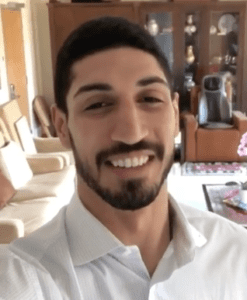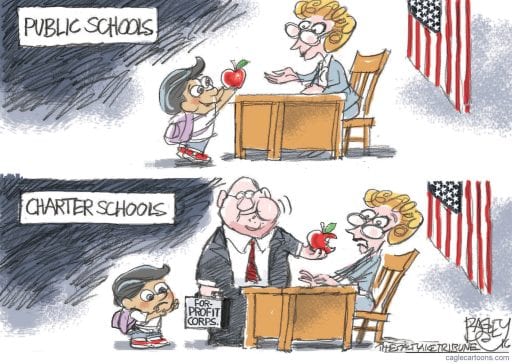An Open Letter to Enes Kanter:
Thank you for your continued support of children, especially low-income and immigrant students in Oklahoma City. And thank you for your opposition to Turkish President Recep Tayyip Erdogan. I live halfway between Dove Academy, a part of the charter Gülen chain, and the Raindrop Turkish American Cultural Center in Oklahoma City. I’m so thankful for the multicultural contributions of immigrants to Oklahoma City.
 While I’m thrilled by the contributions of past and present Thunder NBA basketball players to Oklahoma City schools, I would ask you to please reconsider your application for the Enes Kanter School for Exceptional Learning charter school [EKSEL]. Rather than open another charter, which will inevitably sow divisiveness and damage neighborhood schools serving our poorest children of color, I hope you will consider a proposal along the lines of the win-win education contribution of Lebron James.
While I’m thrilled by the contributions of past and present Thunder NBA basketball players to Oklahoma City schools, I would ask you to please reconsider your application for the Enes Kanter School for Exceptional Learning charter school [EKSEL]. Rather than open another charter, which will inevitably sow divisiveness and damage neighborhood schools serving our poorest children of color, I hope you will consider a proposal along the lines of the win-win education contribution of Lebron James.
The New York Times notes that the LeBron James’ I Promise School is “unlike other schools connected to celebrities” in that “I Promise is not a charter school run by a private operator but a public school operated by the district. Its population is 60% black, 15% English-language learners and 29% special education students. Three-quarters of its families meet the low-income threshold.
Moreover, “the school negotiated with the Akron Education Association for an extra hour a day and an extended year to put into place programs intended to address students’ social and emotional needs.” And its first students “posted extraordinary results in their first set of district assessments. Ninety percent met or exceeded individual growth goals in reading and math, outpacing their peers across the district.”
Another New York Times report addressed an issue that must be acknowledged. The Times acknowledged Gülen charters often produce high test scores, as well as financial irregularities. It noted that not all critics of Gülen are “untainted by xenophobia.” But that has nothing to do with the reasons why we are urging you to consider the oversupply of charters in Oklahoma City.
As The Atlantic’s Scott Beauchamp explained, there are reasons “completely unrelated to Islamic doctrine” why you should question the practices and the claims of Gülen charters. He recounts a long list of financial scandals, as well as legal efforts to keep the charter chain from revealing crucial information.
My reading of the scandals’ evidence is that the problem isn’t sectarianism but corporatism. I’m also convinced by the case made by Beauchamp that, “In other words, it isn’t the Gülen movement that makes Gülen charter schools so secretive. It’s the charter school movement itself.”
For instance, Oklahoma City’s Dove Academy charter was audited by the much-respected State Auditor and Inspector Gary Jones at the request of the State Department of Education. The Oklahoman reported the findings:
The Sky Foundation, which manages Dove Charter Schools, has collected about $3.182 million more in lease payments for use of the Dove Science Academy-OKC school site than it paid to originally purchase the property, auditors said.
My two decades teaching in the inner city brings up another, I believe greater, concern. The Oklahoman reported that EKSEL would highlight “reading, writing, math and science skills.” This may sound like a wonky distinction, but it is a key to whether the test scores of charters, like Dove Academy and other Gülen schools, reflect meaningful learning, or in-one-ear-out-the-other, skills-based instruction.
Our kids deserve holistic instruction in reading, writing, math and science. If the focus is not on retention of background knowledge, critical thinking, and creativity, skills-driven instruction is likely to temporarily jack up bubble-in test scores. But there will be no reason to conclude that those “outcomes” will benefit students.
And that leads to a huge problem with charters that are mostly non-union and often staffed with uncertified teachers. If teachers do not have due process rights, how will you know whether students are receiving the type of instruction which will improve their long-term life prospects? Without a collective bargaining agreement, what are the chances that your staff would dare blow the whistle on drill-and-kill instruction and test prep malpractice?
Sadly, this crucial issue leads to a related, negative result of charters. For nearly two decades, learning has been undermined by competition-driven policies, with test scores being the ammunition for the battle between traditional public schools and charters. Oklahoma City, like so many urban centers, has an over-supply of charters. Consequently, we cannot expand choice to benefit some students without hurting others.
One big reason for the damage is that neighborhood schools take everyone who walks through their doors. At best, charters only accept and retain as many high-challenge students as they think they can handle. They may deny they are “creaming” the easiest to educate students. But if you sponsor a charter, how will you know what is really happening? How will you know how much your school is increasing segregation?
Finally, I have more than three decades of experience playing pick-up basketball with students in Morocco, Mexico, and the U.S., so I appreciate your desire to also emphasize sports and extracurricular activities. You may not believe this, but my athletic skills weren’t the reason why I was usually picked first. What our kids want is trusting, loving relationships with adults. And given the magnitude of the challenges that Oklahoma City students bring to school, education must become a team effort.
So, let’s play a one-on-one game, and if I win, you will open a neighborhood school, staffed by certified, unionized teachers who will team up with counselors, social workers, and other mentors.
Just kidding! Or at least I’m joking about our competition. [Although I would like to explain how I taught Blake Griffin’s dad how to rebound. … Actually our high school’s coach, Tommy Griffin, played with me like I was a puppy, always prompting guffaws by the student-athletes. But when adults come together in a community effort, our kids feel valued, and they respond constructively.]
I urge you to seriously contemplate the question of how we can create meaningful, life-changing education opportunities. For over two decades, charter-driven reforms have imposed test and punish school cultures; the stress of testing has failed to ameliorate the stress of poverty. Charters have added to the extreme concentrations of the highest-poverty kids, who have survived the most trauma, in neighborhood schools. The stress of choice-driven segregation has failed to alleviate the stress of racial and economic segregation.
And Mr. Kanter, in the case of your proposal, the lack of transparency perpetuated by charters, will not contribute to the open collaboration by public schools and community partners that our underfunded Oklahoma City schools need.








